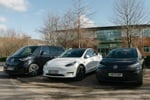‘Good food sold here’ – looking at the sign outside the seaside café, I was left pondering what other adjectives were possible.
‘Average’ or ‘bad’ as descriptors were unlikely to be appropriate options for a business selling food. ‘Fresh’ or ‘home-made’ (whatever that is) may have given some positive perspective on what was being sold.
As I stood outside the café, it did not stretch the bounds of possibility that food would be available – why then was it necessary to state something so obvious?
When I visit car retailers and manufacturers, I hear and see a different, but equally obvious mantra. We have a new phraseology in the sector based on phrases such as “we put the customer at the heart of our business”; “We are customer-focused”; “We are customer-centric”; or “We put the customer first”.
There are many such slogans that greet customers on arrival, and I am sure it is reassuring to hear and read such kind words. But most visitors already assume that they will be regarded with some benevolence. One would not expect the opposite, i.e. “We aren’t really bothered about you or your preferences, what in fact matters is what we need to sell to stay in business”.
Being focused on what a customer needs/wants is fundamental to most business transactions. It is a fundamental truth that it is easier to sell a customer something they want than something they are not too keen on.
The challenge comes when there are supply chain issues. It is very difficult to argue that an organisation is customer-centric when there is a shortage of vehicles. Pressure then comes from the manufacturer and the dealership management to ‘get the customer into something you have in stock’. The disconnect between the philosophy and the practicalities of making sales is an underlying tension that suggests ‘customer first’ is an aspiration rather than a reality.
One of the problems is that many manufacturers do not make allowances for stock shortages. Although it is difficult to forecast trends in a complex and dynamic market, the shortages are not created by the retail network – the blame has to be with the manufacturer or the national sales company. It results in whatever good intentions the retailer had of being customer-centric being thrown out in the attempt to hit targets that are unattainable due to supply issues.
The one thing that my seaside café did offer was the ability to walk in and decide whether the food was good or not.
With many car retailers, that appraisal may happen sometime in the future, or, if the customer walks away, it may never take place. In some circumstances, being customer-focused is based not around selling a product, but selling patience as a virtue.















Login to comment
Comments
No comments have been made yet.